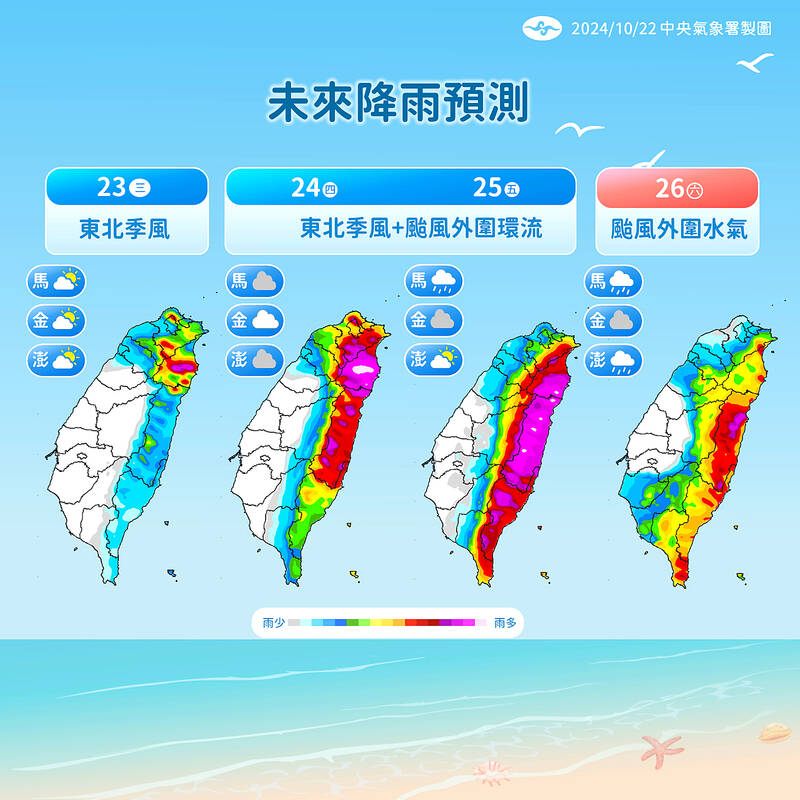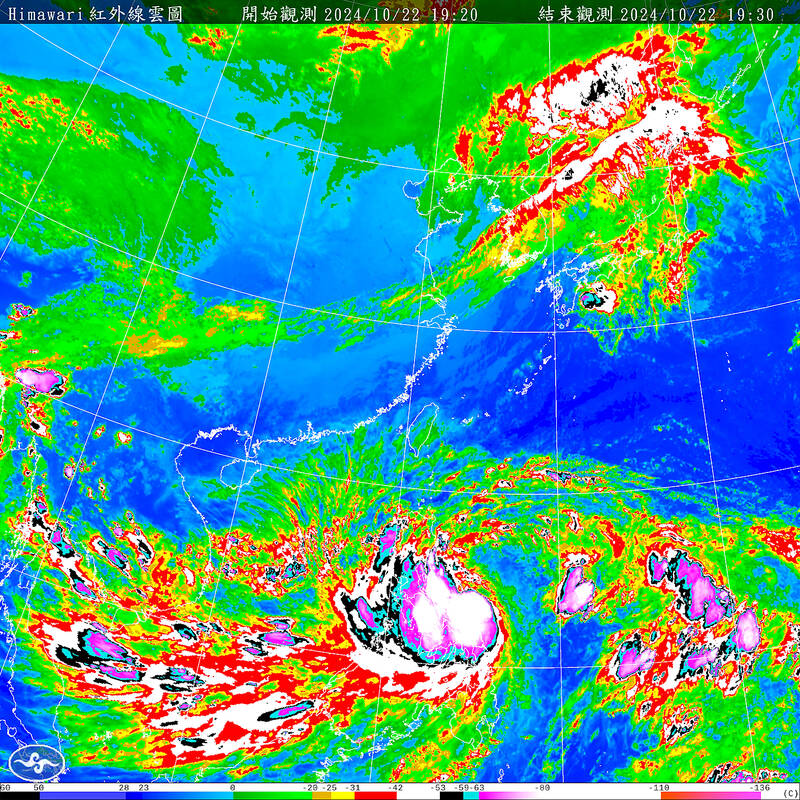A tropical depression east of the Philippines became a tropical storm named Trami at 2am yesterday, and is projected to move west-northwest toward waters east of Luzon Island, the Central Weather Administration (CWA) said.
As of 8am, Trami’s center was 700km east of Manila, or 1,180km southeast of Oluanpi (鵝鑾鼻), Taiwan’s southernmost tip, moving in a northwesterly direction.
It was carrying maximum sustained winds of 65kph, with gusts of up to 90kph, CWA data showed.

Photo courtesy of the Central Weather Administration
The weather agency forecast the center of the storm would be over waters 470km east-northeast of Manila or 820km southeast of Oluanpi at 8am today, and urged ships sailing in the Bashi Channel and east of the Philippines to closely watch Trami’s movements.
Independent meteorologist Daniel Wu (吳德榮) did not expect the storm to have a direct impact on Taiwan, and said Trami’s core structure was loose and unlikely to intensify into a typhoon.
Yet while the probability of a direct hit on Taiwan had fallen below 8 percent, the storm could bring significant rainfall to eastern Taiwan because of its size, he said yesterday.

Photo: screen grab from the Central Weather Administration Web site
Trami’s peripheral winds are set to bring rainfall in Taiwan’s northern and eastern areas, the CWA said.
The agency is highly unlikely to issue land or sea warnings for the storm, but Trami’s radius is expected to grow to 280km this afternoon, increasing the risk of torrential rain and related effects in northern Taiwan as well as Yilan and Hualien counties over the following two days, CWA forecaster Huang En-hung (黃恩鴻) said.
Additional reporting by Lin Chih-yi

TRUST: The KMT said it respected the US’ timing and considerations, and hoped it would continue to honor its commitments to helping Taiwan bolster its defenses and deterrence US President Donald Trump is delaying a multibillion-dollar arms sale to Taiwan to ensure his visit to Beijing is successful, a New York Times report said. The weapons sales package has stalled in the US Department of State, the report said, citing US officials it did not identify. The White House has told agencies not to push forward ahead of Trump’s meeting with Chinese President Xi Jinping (習近平), it said. The two last month held a phone call to discuss trade and geopolitical flashpoints ahead of the summit. Xi raised the Taiwan issue and urged the US to handle arms sales to

A magnitude 5.6 earthquake struck off the coast of Yilan County at 12:37pm today, with clear shaking felt across much of northern Taiwan. There were no immediate reports of damage. The epicenter of the quake was 16.9km east-southeast of Yilan County Hall offshore at a depth of 66.8km, Central Weather Administration (CWA) data showed. The maximum intensity registered at a 4 in Yilan County’s Nanao Township (南澳) on Taiwan’s seven-tier scale. Other parts of Yilan, as well as certain areas of Hualien County, Taipei, New Taipei City, Taoyuan, Hsinchu County, Taichung and Miaoli County, recorded intensities of 3. Residents of Yilan County and Taipei received

Taiwan has secured another breakthrough in fruit exports, with jujubes, dragon fruit and lychees approved for shipment to the EU, the Ministry of Agriculture said yesterday. The Animal and Plant Health Inspection Agency on Thursday received formal notification of the approval from the EU, the ministry said, adding that the decision was expected to expand Taiwanese fruit producers’ access to high-end European markets. Taiwan exported 126 tonnes of lychees last year, valued at US$1.48 million, with Japan accounting for 102 tonnes. Other export destinations included New Zealand, Hong Kong, the US and Australia, ministry data showed. Jujube exports totaled 103 tonnes, valued at

BIG SPENDERS: Foreign investors bought the most Taiwan equities since 2005, signaling confidence that an AI boom would continue to benefit chipmakers Taiwan Semiconductor Manufacturing Co’s (TSMC, 台積電) market capitalization swelled to US$2 trillion for the first time following a 4.25 percent rally in its American depositary receipts (ADR) overnight, putting the world’s biggest contract chipmaker sixth on the list of the world’s biggest companies by market capitalization, just behind Amazon.com Inc. The site CompaniesMarketcap.com ranked TSMC ahead of Saudi Aramco and Meta Platforms Inc. The Taiwanese company’s ADRs on Tuesday surged to US$385.75 on the New York Stock Exchange, as strong demand for artificial intelligence (AI) applications led to chip supply constraints and boost revenue growth to record-breaking levels. Each TSMC ADR represents